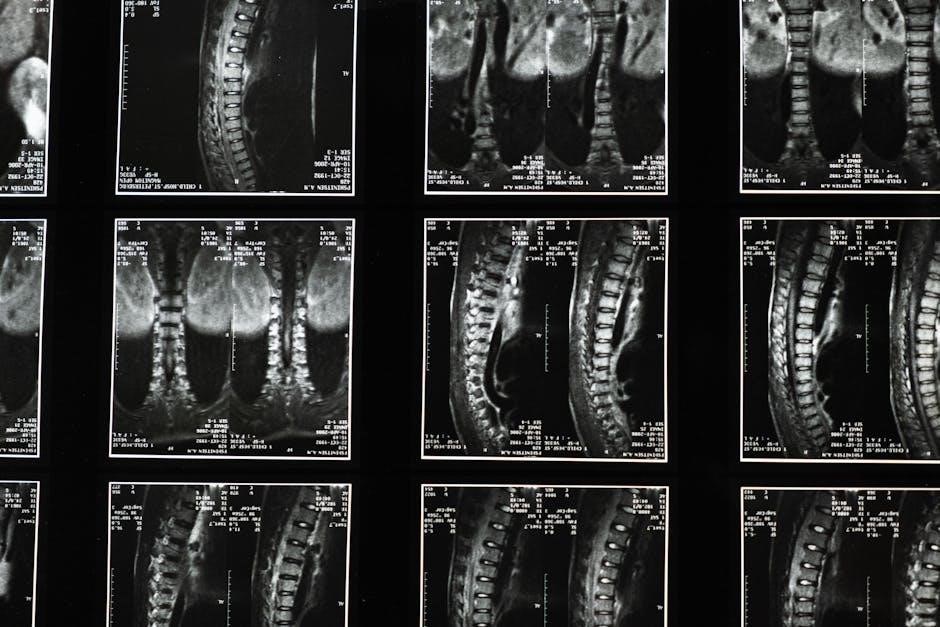
Spinal Cord Stimulation (SCS) is a promising treatment for chronic pain‚ involving electrical pulses to the spinal cord. Psychological evaluation ensures mental readiness‚ crucial for success.
Overview of SCS and Its Applications
Spinal Cord Stimulation (SCS) is a minimally invasive therapy delivering electrical pulses to the spinal cord‚ interrupting pain signals to the brain. Widely used for chronic pain management‚ SCS is particularly effective for conditions like failed back surgery syndrome (FBSS) and complex regional pain syndrome (CRPS). It is also applied to treat refractory angina and peripheral neuropathy. SCS involves implanting a small device that can be adjusted post-implantation‚ offering personalized pain relief. This treatment is often considered when conventional therapies fail‚ providing significant improvement in quality of life for many patients.
Importance of Psychological Evaluation in SCS
Psychological evaluation is critical in Spinal Cord Stimulation (SCS) to ensure patients are mentally prepared for the therapy. It assesses mental health‚ coping mechanisms‚ and expectations‚ identifying factors that may impact outcomes. Depression‚ anxiety‚ or unrealistic expectations can hinder success‚ while a stable mindset enhances benefits. Evaluations also help predict adherence to treatment and address potential barriers‚ ensuring a personalized approach for optimal results. This step is essential for maximizing the effectiveness of SCS and improving the patient’s quality of life.

Psychological Evaluation Process
The psychological evaluation process for SCS involves assessing mental health‚ coping strategies‚ and treatment expectations to ensure patients are suitable candidates for the therapy.
Pre-Screening and Candidate Selection Criteria
Pre-screening for SCS involves assessing mental health‚ substance abuse history‚ and coping strategies. Candidates must demonstrate emotional stability and realistic expectations. Psychological testing‚ such as the MMPI or BDI‚ is used to evaluate mental health status. A history of chronic pain and failed treatments is also considered. Patients with active substance abuse or severe cognitive impairment are typically excluded. The goal is to identify individuals likely to benefit from SCS‚ ensuring a strong foundation for successful outcomes and minimizing potential risks.
Role of the Psychologist in SCS Evaluation
The psychologist plays a critical role in evaluating SCS candidates‚ assessing mental health‚ coping strategies‚ and emotional stability. They conduct interviews‚ administer psychological tests‚ and identify potential barriers to success. The psychologist also evaluates substance abuse history‚ cognitive function‚ and the patient’s ability to manage chronic pain. Their findings help determine if SCS is appropriate and whether additional support is needed. This ensures a comprehensive assessment‚ optimizing outcomes and reducing risks associated with the procedure.
Why Psychological Evaluations Are Necessary
Psychological evaluations are essential to assess a patient’s mental readiness for SCS. They identify underlying mental health issues‚ substance abuse‚ or cognitive impairments that could impact outcomes. These evaluations ensure patients have realistic expectations and coping strategies for chronic pain management. By addressing psychological factors‚ the likelihood of successful SCS outcomes increases‚ reducing risks and enhancing overall well-being. This step is crucial for optimizing treatment effectiveness and patient satisfaction.
Components of Psychological Evaluation
Psychological evaluations for SCS include clinical interviews‚ mental health assessments‚ and specific tests to gauge emotional stability‚ coping mechanisms‚ and cognitive function‚ ensuring comprehensive patient profiling.
Clinical Interview and Patient History
The clinical interview is a cornerstone of psychological evaluation for SCS candidates. It involves a detailed discussion of the patient’s pain experience‚ medical history‚ and psychological state. Psychologists assess coping strategies‚ emotional responses‚ and support systems. The interview also explores the patient’s expectations and motivations for undergoing SCS. Additionally‚ a thorough review of the patient’s history‚ including past treatments‚ mental health conditions‚ and substance use‚ is conducted to identify potential risk factors. This comprehensive approach ensures a personalized and informed evaluation process‚ fostering collaboration between the psychologist and other healthcare providers.
Psychological Testing and Assessments
Psychological testing is a critical component of the evaluation process for SCS candidates. Standardized assessments‚ such as personality inventories and symptom checklists‚ are used to identify mental health issues like depression‚ anxiety‚ or catastrophizing. Tests like the Minnesota Multiphasic Personality Inventory (MMPI-2) and the Beck Depression Inventory (BDI) help evaluate emotional stability and coping mechanisms. These tools provide insights into the patient’s psychological profile‚ aiding in predicting SCS outcomes and guiding personalized treatment plans. The results are often combined with clinical interview data for a comprehensive assessment.
Specific Psychological Tests for SCS Candidates
Several psychological tests are specifically used to assess SCS candidates. The Minnesota Multiphasic Personality Inventory (MMPI-2) evaluates personality traits and emotional stability. The Beck Depression Inventory (BDI) measures depressive symptoms‚ while the Pain Catastrophizing Scale (PCS) assesses pain-related cognitive processes. Additionally‚ the Coping Strategies Questionnaire (CSQ) examines pain management techniques. These tools help identify psychological factors that may influence SCS outcomes‚ ensuring a more personalized and effective treatment approach for chronic pain management.
Risk Factors and Contraindications
Mental health issues‚ substance abuse‚ and cognitive impairments are key risk factors for SCS. These conditions may hinder treatment efficacy or lead to poor patient outcomes.
Mental Health Issues in SCS Candidates
Mental health issues‚ such as depression‚ anxiety‚ and personality disorders‚ are common among SCS candidates. These conditions can significantly impact treatment outcomes and patient satisfaction. Psychological evaluations help identify individuals with untreated mental health issues‚ which may require intervention before proceeding with SCS. Untreated mental health conditions can lead to poor pain management‚ decreased device efficacy‚ and increased risk of post-implantation complications. Addressing these issues is crucial for optimizing SCS success and improving overall quality of life for patients with chronic pain.
Substance Abuse and SCS
Substance abuse is a significant concern in SCS candidates‚ as it can interfere with treatment outcomes and device efficacy. Psychological evaluations are critical to identify individuals with active substance use disorders‚ which may require intervention before SCS implantation. Active substance abuse can lead to poor compliance‚ increased risk of complications‚ and diminished pain relief. Addressing these issues is essential to ensure the safety and effectiveness of SCS therapy. Untreated substance abuse may result in poorer long-term outcomes and reduced quality of life for patients.
Cognitive Impairment and SCS
Cognitive impairment in SCS candidates can impact treatment outcomes‚ as it may affect understanding and adherence to therapy. Psychological evaluations assess cognitive function to identify potential barriers to successful SCS use. Impairments in memory‚ attention‚ or decision-making may require tailored interventions‚ such as simplified instructions or additional support systems. Untreated cognitive issues could lead to device misuse or reduced efficacy‚ emphasizing the need for comprehensive psychological assessment to ensure patient safety and optimal SCS performance.

Preparing for the Psychological Evaluation
Understand the process‚ be honest about mental health history‚ and ask questions to ensure readiness for the evaluation and SCS treatment.
What to Expect During the Evaluation
During the psychological evaluation for SCS‚ patients undergo a thorough assessment‚ including clinical interviews and standardized tests. The process evaluates mental health history‚ coping strategies‚ and expectations. It also assesses cognitive function‚ emotional stability‚ and potential risks like substance abuse or unresolved trauma. The goal is to determine psychological readiness and likelihood of benefiting from SCS. Patients should be honest and prepared to discuss their pain experience and mental health openly. This helps in creating a personalized plan for success.
How to Prepare for the Psychological Evaluation
To prepare for the psychological evaluation‚ organize your medical history‚ including past treatments and mental health records. Review the evaluation process to understand what to expect. Complete any pre-evaluation forms honestly and thoroughly. Be ready to discuss your pain experience‚ emotional state‚ and lifestyle openly. Arrive early‚ bring necessary documents‚ and ask questions if unsure. A prepared mindset ensures accurate assessment and personalized recommendations‚ fostering a successful outcome for spinal cord stimulation.
Handling Denial and Resistance
Addressing denial involves empathetic listening and educating patients about the benefits of psychological evaluation. Strategies include active listening‚ providing clear information‚ and building trust to reduce resistance.
Addressing Patient Denial
Addressing patient denial requires empathetic communication and validation of their feelings. Providers should acknowledge the patient’s perspective while gently redirecting the conversation to the benefits of psychological evaluation. Educational strategies‚ such as explaining the role of mental health in pain management‚ can help reduce resistance. Using real-life examples or success stories may also alleviate concerns. It is crucial to address misconceptions and provide reassurance‚ fostering a supportive environment that encourages openness and cooperation throughout the evaluation process.
Strategies to Overcome Resistance
Effective strategies to overcome resistance include active listening‚ patient education‚ and setting realistic expectations. Providers should emphasize the importance of psychological evaluation in optimizing SCS outcomes. Offering clear‚ evidence-based information can alleviate fears and misconceptions. Involving patients in the decision-making process fosters a sense of control and trust. Additionally‚ providing examples of successful outcomes and addressing concerns compassionately can reduce resistance. Regular follow-up and open communication further ensure patient engagement and cooperation throughout the evaluation process.

Mental Health and SCS Outcomes
Mental health significantly influences SCS outcomes‚ with conditions like depression and anxiety impacting efficacy. Addressing these factors through psychological support is crucial for optimal results and patient well-being.
Impact of Mental Health on SCS Success
Mental health plays a critical role in determining the success of Spinal Cord Stimulation (SCS). Conditions such as depression‚ anxiety‚ and stress can significantly influence pain perception and treatment outcomes. Patients with untreated mental health issues may experience reduced efficacy of SCS‚ as psychological distress can hinder the device’s ability to manage pain effectively. Conversely‚ improved mental well-being can enhance the benefits of SCS‚ leading to better overall quality of life. Addressing mental health through psychological support is essential for optimizing SCS results and ensuring long-term patient satisfaction.
Stress‚ Anxiety‚ and SCS
Stress and anxiety can significantly impact the outcomes of Spinal Cord Stimulation (SCS). Elevated stress levels and anxiety may impede the effectiveness of SCS by increasing pain sensitivity and reducing the device’s ability to provide relief. Psychological evaluations are crucial to identify these factors‚ as untreated anxiety and stress can hinder long-term success. Addressing these issues through counseling and stress management techniques can enhance the benefits of SCS‚ leading to improved pain relief and overall well-being for patients.
Depression and SCS Outcomes
Depression significantly influences the effectiveness of Spinal Cord Stimulation (SCS). Untreated depression can hinder pain relief and reduce the overall success of SCS. Psychological evaluations are essential to identify depressive symptoms‚ as they can predict poorer outcomes if left unaddressed. Managing depression through therapy and medication is crucial to enhance SCS efficacy. Addressing mental health improves patient well-being and increases the likelihood of favorable results from the procedure‚ making it a critical component of pre- and post-SCS care.
Special Populations
Spinal Cord Stimulation (SCS) requires careful evaluation in special populations‚ including elderly patients‚ those with chronic pain‚ and trauma survivors. Tailored psychological assessments ensure optimal outcomes for these groups.
Psychological Evaluation in Elderly Patients
Psychological evaluations for elderly SCS candidates are crucial‚ as aging may present unique challenges. Assessments focus on cognitive function‚ mental health history‚ and coping mechanisms. Elderly patients often have comorbidities‚ such as depression or anxiety‚ which can impact SCS outcomes. The evaluation ensures they can manage the technology and adhere to post-implantation care. Additionally‚ social support systems are examined to predict long-term success. Tailored approaches‚ including validated tools and clinical interviews‚ help determine suitability and ensure safe‚ effective outcomes for this population.
Evaluating Patients with Chronic Pain
Evaluating patients with chronic pain for SCS involves assessing their mental and emotional readiness. Chronic pain often leads to psychological distress‚ such as depression or anxiety‚ which can influence SCS outcomes. The evaluation focuses on identifying coping mechanisms‚ pain perception‚ and the impact of pain on daily life. Validated psychological tools and clinical interviews are used to gauge suitability. Addressing these factors ensures that patients are mentally prepared for the procedure and its long-term management‚ optimizing the likelihood of a successful outcome and improved quality of life.
SCS in Patients with a History of Trauma
Patients with a history of trauma require careful evaluation for SCS‚ as unresolved psychological issues may impact outcomes. Traumatic experiences can lead to heightened stress‚ anxiety‚ or emotional vulnerability‚ which may influence pain perception and device acceptance. The psychological assessment must address trauma-related symptoms‚ such as PTSD or emotional distress. Tools like trauma-specific inventories are used to evaluate resilience and coping mechanisms. Ensuring emotional stability and addressing trauma-related concerns are critical to maximize the benefits of SCS and promote long-term success for these patients.
Psychological Evaluation and Treatment Outcomes
Psychological evaluation is key to predicting SCS treatment outcomes‚ as mental health‚ coping mechanisms‚ and patient expectations significantly influence success rates and long-term pain relief efficacy.
Predicting Success with Psychological Evaluation
Psychological evaluation plays a critical role in predicting the success of spinal cord stimulation (SCS) by identifying patients who are mentally prepared and likely to benefit. Factors such as mental health status‚ coping mechanisms‚ and patient expectations are assessed to determine suitability. Patients with stable mental health and realistic expectations tend to have better outcomes. The evaluation also helps identify potential barriers‚ such as untreated depression or anxiety‚ which could hinder treatment success. By addressing these factors‚ healthcare providers can improve the likelihood of positive results and patient satisfaction with SCS therapy.
Managing Patient Expectations
Managing patient expectations is crucial for the success of spinal cord stimulation (SCS) therapy. Setting realistic goals helps patients understand the potential benefits and limitations of the treatment. Unrealistic expectations can lead to disappointment and dissatisfaction‚ even if the procedure is technically successful. Healthcare providers should ensure patients are well-informed about what SCS can and cannot achieve. Aligning patient perspectives with likely outcomes enhances satisfaction and adherence to the treatment plan‚ ultimately improving the overall experience and results of the therapy.
Psychological Evaluation as a Predictor of SCS Efficacy
Psychological evaluations play a vital role in predicting the efficacy of spinal cord stimulation (SCS) therapy. By assessing mental health factors such as anxiety‚ depression‚ and coping mechanisms‚ these evaluations help identify patients who are more likely to benefit from SCS. A patient’s psychological state significantly influences pain perception and treatment outcomes. Thus‚ psychological evaluations serve as a critical tool for optimizing patient selection and ensuring the best possible results from the procedure.

Post-Implantation Psychological Support
Ongoing psychological support post-SCS implantation is crucial for addressing emotional and mental challenges. Counseling and therapy help patients adapt‚ while support groups provide community and shared experiences.
Need for Ongoing Psychological Support
Post-SCS implantation‚ ongoing psychological support is essential to address mental health challenges. Patients may face stress‚ anxiety‚ or depression‚ impacting SCS outcomes. Continuous support ensures emotional well-being‚ helps manage expectations‚ and fosters resilience; Regular counseling and therapy sessions can provide coping strategies and improve quality of life. Additionally‚ support groups offer a platform for sharing experiences‚ reducing isolation‚ and promoting a positive mindset. This comprehensive approach ensures patients adapt effectively to their new reality‚ maximizing the benefits of SCS treatment.
Counseling and Therapy Post-SCS
Counseling and therapy post-SCS are vital for addressing psychological challenges. These interventions help patients adapt to life with the device‚ manage expectations‚ and cope with emotional changes. Techniques like cognitive-behavioral therapy (CBT) and mindfulness can reduce stress and anxiety. Therapy also provides tools to improve mental health and enhance overall well-being. Regular sessions ensure patients maintain a positive outlook and address any emerging issues. Individualized plans and support groups further strengthen the therapeutic process‚ fostering long-term success and quality of life post-implantation.
Support Groups for SCS Patients
Support groups for SCS patients provide a platform for sharing experiences and emotional support. These groups connect individuals with similar journeys‚ fostering a sense of community and understanding. They offer practical advice‚ coping strategies‚ and encouragement‚ helping patients navigate life post-implantation. Support groups can be in-person or online‚ ensuring accessibility for all. Group leaders often facilitate discussions‚ addressing challenges and celebrating successes. These gatherings empower patients‚ reinforcing their ability to manage life with an SCS device while maintaining mental and emotional well-being.

Future Directions and Research
Emerging trends in SCS psychological evaluation include advanced assessment tools and studies on long-term mental health outcomes‚ addressing research gaps to optimize patient selection and therapy success.
Emerging Trends in SCS Psychological Evaluation
Emerging trends include the integration of AI-driven assessment tools and personalized psychological profiles to enhance accuracy. Research focuses on long-term mental health outcomes and cognitive adaptation post-SCS. Advances in telehealth platforms enable remote evaluations‚ improving accessibility. Studies are exploring the role of mindfulness-based interventions and resilience training to optimize SCS success. Additionally‚ there is a growing emphasis on addressing research gaps‚ such as the psychological impact of SCS in diverse populations and the development of standardized evaluation protocols. These innovations aim to refine patient selection and improve therapy efficacy.
Research Gaps and Future Studies
Despite advancements‚ research gaps remain in understanding long-term psychological outcomes of SCS. Future studies should focus on cognitive changes post-implantation and mental health in diverse populations. Standardized psychological evaluation tools and collaborative efforts between psychologists and neurologists are needed. Additionally‚ exploring the impact of SCS on trauma survivors and elderly patients could provide valuable insights. Addressing these gaps will enhance the reliability of psychological assessments and improve patient selection criteria for SCS therapy.
Advancements in Psychological Assessment Tools
Recent advancements in psychological assessment tools have enhanced the accuracy of evaluations for SCS candidates. AI-driven platforms now offer personalized assessments‚ improving reliability. Digital tools enable real-time data collection and analysis‚ reducing biases. Mobile apps and online platforms make assessments more accessible. These innovations allow psychologists to identify high-risk patients more effectively. Additionally‚ machine learning algorithms can predict long-term outcomes‚ aiding in better patient selection. Such advancements are revolutionizing the field‚ ensuring more precise and efficient psychological evaluations for SCS therapy.
Psychological evaluation for spinal cord stimulator candidates ensures mental readiness and identifies potential barriers to success. It involves clinical interviews‚ psychological testing‚ and assessing mental health issues‚ substance abuse‚ and cognitive impairment. Proper preparation and addressing denial are crucial for patient cooperation. Mental health significantly impacts outcomes‚ with stress‚ anxiety‚ and depression affecting success. Special populations‚ like the elderly and trauma survivors‚ require tailored evaluations. Psychological support post-implantation is essential for long-term efficacy‚ emphasizing the importance of ongoing care and patient-centered approaches.
Final Thoughts on Psychological Evaluation in SCS
Psychological evaluation is crucial for ensuring spinal cord stimulation candidates are mentally prepared for treatment. It identifies potential barriers‚ such as mental health issues or substance abuse‚ and helps tailor interventions. By addressing these factors‚ evaluations maximize the likelihood of successful outcomes. Ongoing psychological support post-implantation further enhances patient well-being. This comprehensive approach highlights the importance of mental health in achieving optimal results from spinal cord stimulation therapy.

Resources and References
For further reading‚ download the official Spinal Cord Stimulator Psychological Evaluation PDF. Explore peer-reviewed studies and clinical guides for comprehensive insights into SCS evaluation processes.
Recommended Reading and Guides
For in-depth understanding‚ refer to peer-reviewed journals and clinical guides on SCS psychological evaluation. The Spinal Cord Stimulator Psychological Evaluation PDF is a key resource‚ offering detailed assessment criteria. Explore articles in Pain Management and Neuromodulation journals for evidence-based practices. Additionally‚ consult guidelines from professional organizations like the North American Neuromodulation Society for comprehensive insights into patient selection and evaluation processes. These resources provide valuable frameworks for both clinicians and patients seeking to understand the psychological aspects of SCS.
Where to Find the Spinal Cord Stimulator Psychological Evaluation PDF
The Spinal Cord Stimulator Psychological Evaluation PDF can be accessed through academic databases like PubMed‚ ResearchGate‚ and Google Scholar. Many hospitals and pain management clinics also provide downloadable guides on their websites. Additionally‚ professional organizations such as the North American Neuromodulation Society often publish comprehensive resources. Use specific search terms like “SCS psychological evaluation guidelines” or “Spinal Cord Stimulator Psychological Assessment PDF” to locate reliable sources. Ensure to verify the credibility of the publisher for accurate information.